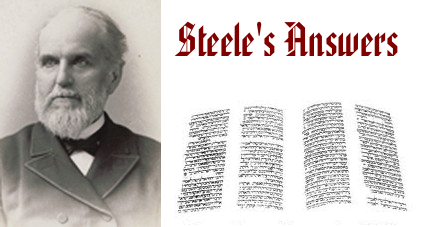If the grand design of the gospel be any thing less than perfect purity, then the soul can find full rest without it. If it be only pardon and regeneration, then the discovery of remaining corruptions ought to be no cause of uneasiness; the prayers of those who groan for full redemption ought to be unheeded; or, if relief be found, it ought to be in some other system — through some other name than the name of Jesus.
But what facts does experience reveal? Why, that a deep and painful sense of inward impurity may remain after all guilt is washed away; that in the midst of the divine comforts of adoption the soul longs for the rest of perfect love; that the more devoted the life of the regenerate Christian, the more intense is his desire to be cleansed from all sin, and while he is without the evidence of this finished work, he has more or less of fear for the future. By the most powerful internal convictions, and the most obvious tendencies of every work of grace that has is heretofore been wrought upon his heart, he is urged on to this glorious consummation. And it is not in accordance with experience that he who sighs for purity of heart must sigh in vain — that he who cries, "Create in me a clean heart, O God," must pray in vain. From numerous examples in Scripture, from the testimonies of thousands long since gone to their reward, and of thousands still living, the declaration of Jesus is amply sustained: "Blessed are they that hunger and thirst after righteousness, for they shall be filled." So far were they from being compelled to look to other systems and other names for deliverance, that they declare with the utmost confidence it was well said by the angel, "And thou shalt call his name Jesus, for he shall save his people from their sins;" for we have in our hearts the divine assurance that "the blood of Jesus Christ, God's Son, cleanseth us from all sin."
And precisely as it ought to be, if [holiness] is the centre of the [Christian] scheme, here the soul finds rest — here perfect satisfaction. All its desires, all its passions, all its plans are in complete harmony with the will of God. From this sanctified state it can develop itself without inward obstruction — from this position it can expand and advance with freedom and power. The growth of the spirit, which in its original purity must certainly have been infinite, has been sadly interrupted by its dreadful disease. And since the cure commenced it has been much retarded by the remains of the disease. But, now that the cure is complete, and faith is strong and active, growth in grace is free, natural, and rapid. It is true the effects of this malady may long remain after the remedy has been thoroughly successful. Infirmities of body and mind, which constantly need the compassion of God, the merits of Christ, and the charity of men, will press upon us till our probation ends; but, in spite of them all, the soul in a state of perfect salvation, rises, enlarges, and triumphs as it could never have done under any but a remedial system.
Thus directly and inevitably does experience conduct us to holiness as the great want of immortal man — the grand design of redemption.
— The Central Idea of Christianity


